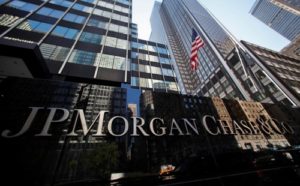“Don’t let anyone deceive you in any way, for that day will not come until the rebellion occurs and the man of lawlessness is revealed, the man doomed to destruction. He will oppose and will exalt himself over everything that is called God or is worshiped, so that he sets himself up in God’s temple, proclaiming himself to be God.”
A Singapore-based subsidiary of Japanese trading giant Mitsubishi recently booked a $320 million loss after several unauthorized derivatives trades went sour, the company revealed in a Friday press release. The bank blamed the losses on a ‘rogue trader’ who allegedly manipulated the subsidiary’s risk-management system, allowing him to place massive derivatives bets on the price of oil and disguise them as hedges similar to what JPMorgan did with the whole London Whale debacle.
Though the bank didn’t release the trader’s name, according to the press release, he was fired earlier this week. The bank has since reported his actions to the local police.
The trader had been taking unauthorized derivatives positions since January, but he suffered heavy losses over the summer as oil prices fell. He reportedly occupied a relatively senior position and was in charge of all transactions involving China for the subsidiary.
The bank launched an investigation into the traders’ positions while he was out of office in the middle of August. It soon discovered the unauthorized positions and decided to unwind them immediately (the bank probably could have minimized losses if it had waited until Monday to unwind those positions when prices spiked nearly 20% intraday).
Because the trader had manipulated the subsidiary’s risk-management system, he was able to make it look like the derivative trades were associated with customer orders.
As the FT points out, Mitsubishi made a $5 billion net profit last year, so the trading loss is more of an embarrassment than a threat to the bank’s survival. But according to Bloomberg, the oil market has a long history of massive trading busts.
The incident is a reminder of the damage that a rogue trader can cause to a large financial institution, according to the FT. The Mitsubishi rogue trader will join a growing ‘rogues gallery’ that includes Société Générale’s Jérôme Kerviel, JPM’s “London Whale” (a.k.a. Bruno Iksil), and Barings’ Nick Leeson.
* * *
Read Mitsubishi’s announcement below:
Losses from Overseas Subsidiary’s Crude Oil Trading
This is to inform you that Mitsubishi Corporation (hereinafter “MC”) can confirm that one of its subsidiaries based in Singapore has realized a previously unidentified loss from derivatives trading. Investigations are currently ongoing to determine all of the details, but what is known so far is outlined below.
MC recognizes the seriousness of this matter and shall be redoubling efforts throughout the entire MC Group to ensure that it does not happen again.
1. Situation at Present
Petro-Diamond Singapore (Pte) Ltd. (hereinafter “PDS”), a subsidiary of MC that engages in the trade of crude oil and petroleum products, has confirmed that it expects to book a loss of approximately 320 million USD from its trade of crude oil derivatives.
Although PDS has already closed the position in question and determined how much was lost on the underlying derivatives, we are now examining the total amount of losses.
2. Facts Determined Thus Far
An employee who was hired locally by PDS to handle its crude oil trade with China (hereinafter “the employee”) was discovered to have been repeatedly engaging in unauthorized derivatives transactions and disguising them to look like hedge transactions since January of this year. Because the employee was manipulating data in PDS’s risk-management system, the derivatives transactions appeared to be associated with actual transactions with PDS’s customers. Since July, the price of crude oil has been dropping, resulting in large losses from derivatives trading. PDS began investigating the employee’s transactions during his absence from work in the middle of August, and that is when the unauthorized transactions were discovered.
3. MC’s and PDS’s Response
After recognizing that the transactions being investigated could result in a loss for PDS, MC and PDS immediately consulted with an outside lawyer and established an investigation team, including local outside experts, to gain an overall picture of the situation and identify the causes.
- PDS quickly closed the derivatives position in question and determined the losses caused by the transactions which were not associated with any crude oil transactions with PDS’s customers. PDS also has since prevented the commencement of any similar transactions.
- MC conducted an internal investigation at PDS, which included inspections of PDS’s contracts, rules, risk management system and internal controls. Based on its findings, MC has reconfirmed that PDS has sufficient internal controls in place, including a middle office responsible for risk management. MC also confirmed PDS already tightened its governance to ensure that any similar improprieties can be detected at a much earlier stage.
- MC also performed investigations at its other MC group companies and MC’s in-house business departments engaged in derivatives trading to determine whether or not any similar improprieties have been taking place. These investigations confirmed that there are no such problems or risks at present.
- PDS terminated the employment of the employee on September 18. In order to take a strong action in response to the violation of internal rules and laws committed by the employee, which has caused PDS this significant loss, PDS lodged a police complaint against the employee on September 19.
4. Impact on MC’s FY2019 Forecast
How the losses will impact MC’s forecast for FY2019 is under investigation and shall be announced if and when a performance review is necessary.
Further details with respect to the ongoing investigations shall be made accordingly. Source
StevieRay Hansen
Editor, Bankster Crime
MY MISSION IS NOT TO CONVINCE YOU, ONLY TO INFORM…
#Fraud #Banks #Money #Corruption #Bankers,#Powerful Politicians, #Businessmen
chilssextrade #pedophiles #lawlessness #mexican #children #molested #kill #badbusiness





